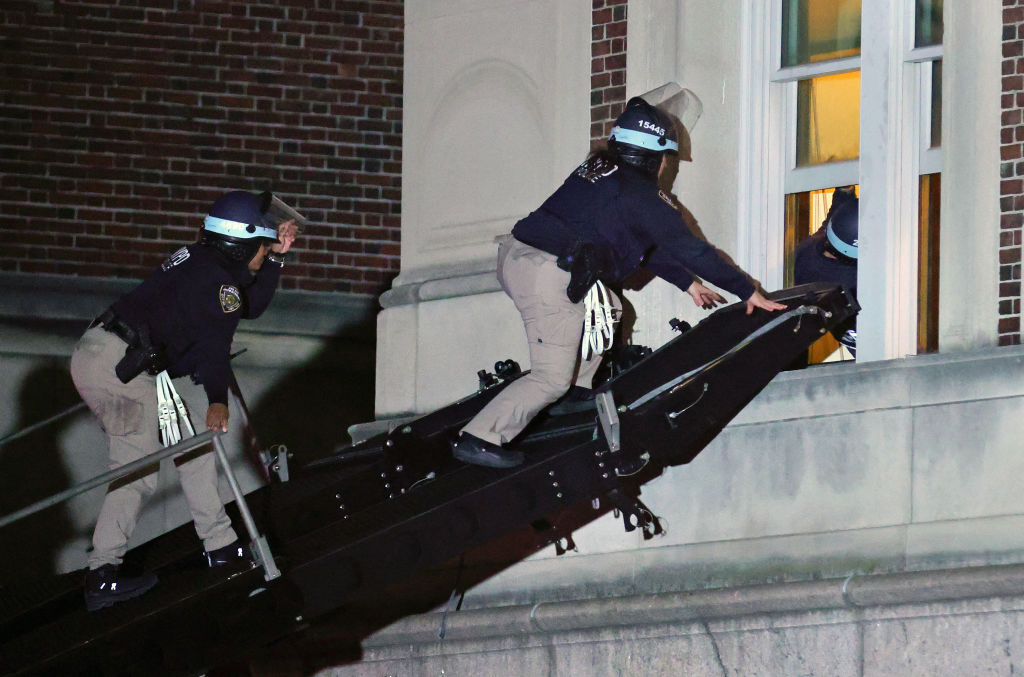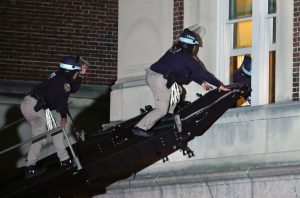
Hundreds of NYPD cops storm Columbia University campus to end pro-Gaza building occupation
By Cayla Bamberger, Emma Seiwell, Kerry Burke and Rocco Parascandola, New York Daily News
Hundreds of NYPD officers in riot gear stormed Columbia University Tuesday evening, forcing out pro-Palestinian students protesters who had had seized an administration building and made dozens of arrests.
The NYPD was also arresting protesters gathering in the streets surrounding the Manhattan campus following the removal of students from the building.
Social media posts from campus and photos from the scene showed NYPD cops entering Hamilton Hall, Columbia’s main administration building, through a window. Students had taken over the building early Tuesday morning amid a weeks-long protest on campus over the war between Israel and Hamas.
“A little after 9 p.m. this evening, the NYPD arrived on campus at the University’s request. This decision was made to restore safety and order to our community,” a Columbia spokesperson said.
“We regret that protesters have chosen to escalate the situation through their actions. After the University learned overnight that Hamilton Hall had been occupied, vandalized, and blockaded, we were left with no choice. Columbia public safety personnel were forced out of the building, and a member of our facilities team was threatened. We will not risk the safety of our community or the potential for further escalation. ”
NYPD officers in riot gear march onto Columbia University campus, where pro-Palestinian students are barricaded inside a building and have set up an encampment, in New York City on April 30, 2024. Columbia University normally teems with students, but a “Free Palestine” banner now hangs from a building where young protesters have barricaded themselves and the few wandering through campus generally appear tense. Students here were among the first to embrace the pro-Palestinian campus encampment movement, which has spread to a number of universities across the United States. (Photo by KENA BETANCUR/AFP via Getty Images)
Police led dozens of protestors from the campus and onto waiting NYPD buses. As one of the buses pulled away, protestors ran into the street and blocked the vehicle.
Students asked to shelter in place in their dorm rooms watched the arrests and chanted “free, free Palestine” as cops pushed protestors up onto the sidewalks, allowing the bus to leave the neighborhood.
The disciplinary decision to expel students involved in the building’s violent takeover came after demonstrators damaged school property and prompted censure from the White House.
The occupation began early Tuesday morning at Hamilton Hall, hours after the school suspended students who ignored an order to break up their encampment. It prompted the university to restrict access to the campus, only allowing students who live in dorms and essential services staff to remain.
“Protesters have chosen to escalate to an untenable situation — vandalizing property, breaking doors and windows, and blockading entrances,” said university spokesman Ben Chang in a statement.
“This is about responding to the actions of the protesters, not their cause,” he continued. “As we said yesterday, disruptions on campus have created a threatening environment for many of our Jewish students and faculty.”
While many classes have already ended for the semester, some graduate programs pivoted to remote. All main campus libraries were shuttered, just as final exam season is getting underway. The restrictions will “remain in place until circumstances allow otherwise,” according to a memo from the university.
Student protesters said in a statement that they will stay until Columbia concedes to three demands: Divestment from Israel, financial transparency and amnesty for all student and faculty disciplinary action related to pro-Palestinian advocacy.
NYPD officers in riot gear march onto Columbia University campus, where pro-Palestinian students are barricaded inside a building and have set up an encampment, in New York City on April 30, 2024. Columbia University normally teems with students, but a “Free Palestine” banner now hangs from a building where young protesters have barricaded themselves and the few wandering through campus generally appear tense. Students here were among the first to embrace the pro-Palestinian campus encampment movement, which has spread to a number of universities across the United States. (Photo by KENA BETANCUR / AFP) (Photo by KENA BETANCUR/AFP via Getty Images)
“Resistance is justified in the movement for liberation,” said Columbia University Apartheid Divest, a coalition of more than 100 groups behind the encampment, which persisted on the lawns while other students occupied the hall.
A rep for Columbia University Apartheid Divest estimated there are around 60 protesters inside the hall, who they said were acting separately from the coalition.
Madeline, a sophomore at Columbia, was trying to make an emergency therapy appointment Tuesday because of the situation on campus. But like many other programs and services, in-person mental health facilities were out of reach.
“I think closing off campus is a horrible idea, to close it off to students,” Madeline said.
“I have meal swipes,” she continued. “I’m basically almost on a full-ride [scholarship] here, so campus dining is my food.”
Hours before cops surrounded the campus, setting up barricades and forcing swaths of people off of streets and up onto the sidewalk, NYPD officials said its officers remained off campus and have not yet been asked to intervene.
Police entered the campus through a southern gate the southern gate at W. 114th St. between Broadway and Amsterdam Ave. just after 9 p.m. as protestors chanted “shame.”
Pro-Palestinian supporters continue to demonstrate with a protest encampment on the campus of Columbia University on April 30, 2024 in New York City. All classes at Columbia University have been held virtually today after school President Minouche Shafik announced a shift to online learning in response to recent campus unrest. (Photo by Spencer Platt/Getty Images)
Mayor Adams and NYPD Commissioner Edward Caban at an evening press conference earlier Tuesday blamed “professional outside agitators” for the escalation of tactics overnight.
Deputy Commissioner of Intelligence and Counterterrorism Rebecca Weiner said those include protesters who scaled buildings clad in black and destroyed cameras.
“If you are a parent or a guardian of a student, please call your child and urge them to leave the area before the situation escalates in any way,” Adams said at police headquarters. “I’m urging every student, every protester to walk away from this situation now and continue your advocacy through other means.”
University officials over the weekend committed to not calling the cops to break up the recent protests, claiming that police intervention would only inflame an already tense situation. Columbia spokesmen Tuesday declined to say if that commitment was still in place.
Videos showed protesters overnight shattering a window with a hammer and creating a barricade with metal chairs outside Hamilton Hall after they entered the building. They chanted during an Instagram livestream: “1, 2, 3, 4, occupation no more; 5, 6, 7, 8, Israel is a terrorist state.”
A Pro-Palestinian supporter waves a Palestinian flag from the roof of Hamilton Hall as they continue to demonstrate with a protest encampment on the campus of Columbia University on April 30, 2024 in New York City. All classes at Columbia University have been held virtually today after school President Minouche Shafik announced a shift to online learning in response to recent campus unrest. (Photo by Spencer Platt/Getty Images)
Protest posters were unfurled from windows and balconies, reading: “Liberation Education” and “STUDENT INTIFADA.” Intifada in Arabic means uprising, which has been used by Palestinians for decades.
Another banner read “Hind’s Hall,” referring to Hind Rajab, a 6-year-old Palestinian girl killed in Gaza during an Israeli military operation in January.
Protesters inside the hall — the center of campus protests in the 1960s — were using tables, chairs and zip-ties to prevent anyone from getting in, according to student newspaper the Columbia Spectator.
The student reporters said they observed a facilities worker, who was already inside the building, leave saying: “They held me hostage.”
Two students tried to block protesters from barricading the doors, saying, “You don’t have a right to tear down our university,” the Spectator reported.
“They’re already inside, dumb a**es,” a protester retorted during the Instagram Live. The student group, Students for Justice in Palestine, used a video filter to put virtual mustaches on the students’ faces.
At least one of the students was removed by physical force, videos show.
Pro-Palestinian supporters continue to demonstrate outside the campus of Columbia University on April 30, 2024 in New York City. All classes at Columbia University have been held virtually today after school President Minouche Shafik announced a shift to online learning in response to recent campus unrest. (Photo by Spencer Platt/Getty Images)
By daytime, black picnic tables flipped upside down were shoved up against the doors, and handles were tied up with rope. Newspapers covered at least six of the glass windows of the hall, up to the third floor.
Protesters throughout the afternoon marched from the front of Hamilton Hall to the campus gates, while one demonstrator on the building’s roof waved a large Palestinian flag and threw a peace sign as the crowd cheered.
Meanwhile, many Columbia students and staff were stuck along the perimeter of campus, removed from jobs and campus facilities.
A 22-year-old physics student who lives off campus was unable to go to work at a Columbia lab. He said he could “understand” why the university tightened security.
“At a time this complicated, it’s very hard to say what’s right or wrong. I’m hoping it calms down, just things generally,” he said.
Barnard faculty overwhelmingly passed a vote of no confidence in President Laura Rosenbury on Tuesday, student newspaper Columbia Spectator reported.
“A lot of people are decrying the use of NYPD, and saying that the university is escalating this,” said Columbia student Caleb, 30. “At every turn the protesters are the ones who are escalating this. For some reason, I don’t hear that viewpoint on campus.”
In their statement, students pleaded with Columbia administrators and trustees: “Do not incite another Kent or Jackson State by bringing soldiers and police officers with weapons onto our campus. Students’ blood will be on your hands.”
The pro-Gaza encampment first emerged on campus on April 17, as Shafik testified before Congress about efforts to curb antisemitism. Thirty hours later, university officials had suspended students involved and called the NYPD, with cops arresting more than 100 students while clearing the lawn.
The protesters quickly returned and reerected the encampment.
Student protesters camp on the campus of Columbia University on April 30, 2024 in New York City. All classes at Columbia University have been held virtually today after school President Minouche Shafik announced a shift to online learning in response to recent campus unrest. (Photo by Mary Altaffer-Pool/Getty Images)
Columbia President Minouche Shafik on Monday morning said negotiations with student protesters had broken down, and Columbia will not divest from Israel. Students were told in writing they had until 2 p.m. to leave the quad or risk suspension. The deadline was ignored.
“The students are again willing to talk, so long as the university takes a step forward in materially addressing the demands of divestment, disclosure and amnesty,” said Sueda Polat, a Columbia graduate student and lead negotiator for the encampment.
Polat said it would be “shortsighted” of the university to expel them for their protest. “I strongly believe that it would galvanize the rest of the campus community,” she said.
With Thomas Tracy


